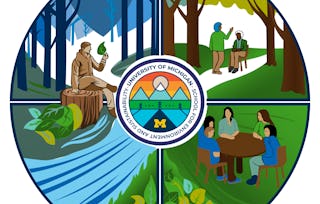Sustainability Consulting will look at the techniques and careers of people who aid individuals, companies, governments, and other organizations in their efforts to pursue sustainability goals. Students will learn core concepts and tools sustainability consultants use (including Life Cycle Analysis). The course will also critically examine common sustainability consultant practices, including ESG, footprinting, and the role of LEED and other sustainability standards.

Sustainability Consulting

108 reviews
What you'll learn
How to apply life-cycle thinking to a product or process supply chain.
Analyze Life Cycle Analysis reports produced by others.
How to critically evaluate sustainability certifications
Skills you'll gain
- Sustainable Development
- Environmental Social And Corporate Governance (ESG)
- Environmental Management Systems
- Environment
- Sustainability Reporting
- Business Consulting
- Sustainability Standards
- Analysis
- Consulting
- Product Lifecycle Management
- Sustainable Business
- Corporate Sustainability
- Skills section collapsed. Showing 6 of 12 skills.
Details to know

Add to your LinkedIn profile
4 assignments
See how employees at top companies are mastering in-demand skills

There are 6 modules in this course
You will become familiar with the course, your classmates, and our learning environment. The orientation will also help you obtain the technical skills required for the course.
What's included
1 reading1 discussion prompt
This week we’ll be introducing the field of sustainability consulting and the key idea of life cycle thinking. A sustainability consultant works with organizations to help them improve their sustainability performance, or to certify that performance. This might mean making sustainability assessments –strategic planning, implementation of sustainability programs, or reporting on sustainability performance. These workers make these judgments using life cycle analysis to make quantitative, replicable determinations of environmental impact. All sustainability consultants either explicitly or implicitly use this technique in their work, and we’ll start the course by learning about this approach.
What's included
6 videos1 reading1 assignment
This week we will be continuing our discussion of life-cycle assessment. This will enable us to see how consultants interpret LCA results: by identifying the significant inventory and impact results, evaluating the reliability and conditions of those results, and finally by stating their conclusions and recommendations. We’ll also begin to look at case studies - starting with Christmas trees!
What's included
5 videos1 reading1 assignment
Environmental, social, and governance (ESG) refers to a set of criteria used to assess the sustainability and ethical impact of investments or business practices. ESG has become an increasingly important concept in recent years as more regulators, investors and customers have become more concerned about measuring the wider impacts of corporations. But the way ESG is rated is not without controversy - and nor are the ways in which companies improve their ESG scores. This week we will apply our life cycle thinking to understand what lots of consultants do, and why it might not always be making the world more sustainable.
What's included
5 videos1 reading1 assignment
For many companies, sustainability certifications are a large part of the value in hiring the services of sustainability consultants. They provide a mark of approval that can help them send the right message to their various stakeholders - be they customers, employees, regulators, or even their peers. These certifications possibly even make the world more sustainable. Good consultants rigorously assess the companies they work with, and as we’ll see this week, their is a wide variety of settings in which these assessments take place. Sometimes sustainability workers even help companies from within.
What's included
4 videos1 reading1 assignment
You will find out where to go next after completing this course and be able to share any thoughts you have on this course experience.
What's included
1 video1 reading
Instructor

Offered by
Explore more from Environmental Science and Sustainability
 Status: Free Trial
Status: Free TrialArizona State University
 Status: Preview
Status: PreviewIESE Business School
 Status: Free Trial
Status: Free TrialArizona State University
 Status: Free Trial
Status: Free TrialUniversity of Michigan
Why people choose Coursera for their career

Felipe M.

Jennifer J.

Larry W.

Chaitanya A.
Learner reviews
- 5 stars
79.62%
- 4 stars
14.81%
- 3 stars
2.77%
- 2 stars
0.92%
- 1 star
1.85%
Showing 3 of 108
Reviewed on Mar 20, 2025
Worth learning this course as sustainability with LCA, ESG, certifications has become an important aspect all around us.
Reviewed on Oct 7, 2024
Really well explained and engaging perspectives. The study material provided was excellent to broaden the scope of thinking and learning. Worth the time and effort.
Reviewed on Sep 11, 2024
Ich habe sehr viel gelernt in diesem Kurs und ein gutes Grundverständnis über die Arbeit von Sustainability Consulting erlangt.

Open new doors with Coursera Plus
Unlimited access to 10,000+ world-class courses, hands-on projects, and job-ready certificate programs - all included in your subscription
Advance your career with an online degree
Earn a degree from world-class universities - 100% online
Join over 3,400 global companies that choose Coursera for Business
Upskill your employees to excel in the digital economy
Frequently asked questions
To access the course materials, assignments and to earn a Certificate, you will need to purchase the Certificate experience when you enroll in a course. You can try a Free Trial instead, or apply for Financial Aid. The course may offer 'Full Course, No Certificate' instead. This option lets you see all course materials, submit required assessments, and get a final grade. This also means that you will not be able to purchase a Certificate experience.
When you purchase a Certificate you get access to all course materials, including graded assignments. Upon completing the course, your electronic Certificate will be added to your Accomplishments page - from there, you can print your Certificate or add it to your LinkedIn profile.
Yes. In select learning programs, you can apply for financial aid or a scholarship if you can’t afford the enrollment fee. If fin aid or scholarship is available for your learning program selection, you’ll find a link to apply on the description page.
More questions
Financial aid available,

